How To Build The Best Skincare Routine For Your Skin Type
How To Build The Best Skincare Routine For Your Skin Type
Finding the right skincare products, ingredients and habits can feel overwhelming – no matter your skin type or the state of your complexion. Daily self-care rituals matter. Over time, these systems can considerably improve how comfortably you feel in your skin, and the results are reflected in the mirror. There’s always room to refine your regimen – whether you’re seeking a beginner’s guide to building a skincare routine (say goodbye to the bar soap or first cleanser you discovered as a teen) or revising your lineup to better suit your skin type or a particular condition. From reducing dry patches, excess shine and fine lines to managing breakouts and eczema, we’ve got you covered.
Here’s your full guide on building the best skincare routine for your skin type and unique complexion concerns. Read on to learn the proper skincare routine order, the best ingredients to use for different skin types (and how to determine your skin type - whether it’s dry, oily or somewhere in between).
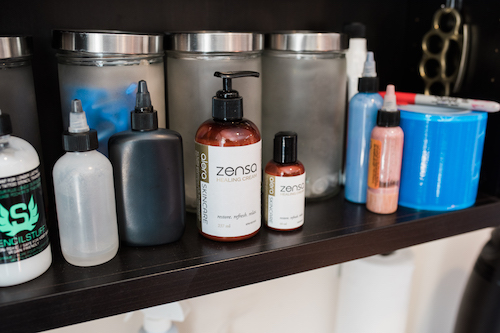
How To Build A Skincare Routine
An effective regimen does not need to be complex, time-consuming or expensive. A basic skincare routine should consist of 4 foundational elements: cleanse, tone, moisturize and (sun) protection. These 4 simple steps serve the following purpose(s):
- Cleanse: Wash your face
- Tone: Balance the skin’s natural oils
- Moisturize: Hydrate the skin & strengthen the skin barrier
- Sun Protection: Shield skin from harmful UV rays, dryness, hyperpigmentation, fine lines, wrinkles and other signs of aging
Consistency is key. Make sure to follow this protocol twice daily – in the morning and at night. Sunscreen only needs to be applied in the morning. Ensure your skincare routine is done in the proper order: cleanse, tone, moisturize, protect. You can also incorporate serums, eye cream, spot treatment, face oil and retinol into your daily routine if you’re feeling fancy (or find that your skin needs some extra TLC). Start using retinol and retinol-infused eye creams in your 20s to reap the maximum skin benefits. With this embellished regimen, the proper skincare routine order would be done in the following steps in the morning and at night:
Morning Skincare Routine Order:
- Cleanser
- Toner
- Serum
- Eye cream
- Spot treatment(s)
- Moisturizer
- Face Oil
- Sunscreen (Use at least SPF 30)
Night Skincare Routine Order:
- Cleanser
- Toner
- Serum
- Eye cream
- Spot treatment(s)
- Moisturizer
- Retinol
- Face Oil
Expert Tip: A strong, well-nourished skin barrier is the key to a healthy, smooth and glowing complexion. Products like Zensa Healing Cream work as an effective moisturizer to promote collagen production for balanced, younger-looking skin. Our nourishing formula contains several antioxidant-rich ingredients to suit nearly every skin type and manage common skin concerns like acne (scars), eczema, redness and dry, itchy skin. Here’s Everything to Know About Zensa Healing Cream.
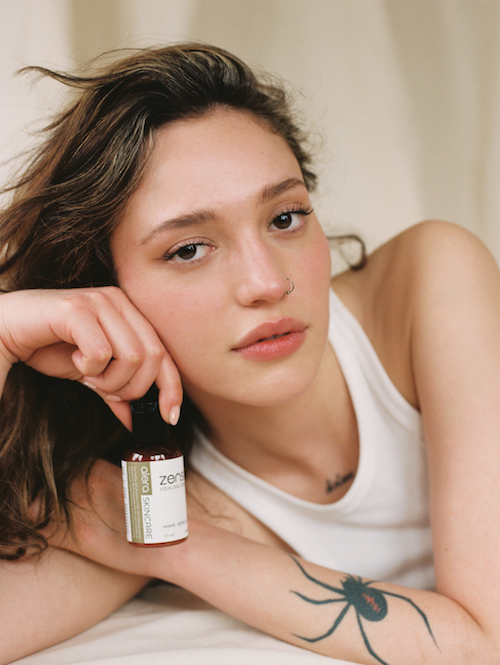
Best Skincare For Dry Skin
When you have dry skin, your complexion is prone to flaking, textured patches and feeling tight. Dry skin often indicates a weakened moisture barrier. A compromised skin barrier makes you more susceptible to transepidermal water loss (TEWL) and environmental damage (pollution, dust, UV rays, etc.) that can lead to broken skin, sun damage, uneven skin tone or texture inflammation and prematurely aged skin. When building the right skincare routine for dry skin, focus on using gentle, hydrating products to nourish and strengthen the skin barrier while preventing irritation (from your skin care products, the sun or any other external factors).
Choose a gentle, non-foaming cleanser with hydrating ingredients, like glycerin, hyaluronic acid and Vitamin E. Pair with a hydrating toner made for dry skin that contains nourishing ingredients such as rose water, niacinamide, hyaluronic acid and aloe vera (Avoid traditional alcohol-based or astringent toners made for combatting acne or oily complexion as they can dehydrate your skin). Combine these products with hyaluronic acid and vitamin C serums to hydrate and lock moisture into the skin. Start your morning and nighttime skincare routine with these three steps (twice daily).
Following up with a hydrating moisturizer is essential. Choose a lighter moisturizer (preferably one containing SPF) and thicker face lotion at night. Look for options that contain restorative, nourishing ingredients like ceramides, niacinamide, hyaluronic acid, shea butter, avocado oil and coconut oil. If you have very dry skin, avoid using retinol, retinoids or any vitamin A derivatives on the skin. These products have a drying effect on the skin and can compound any flaking or irritation issues that you’re trying to remedy, which can further damage your already weakened skin barrier. If you want to reap the benefits of retinol (reducing wrinkles, hyperpigmentation and other signs of skin aging), choose a mild product with a low retinoid concentration. Increase the potency and use frequency if your skin tolerates the retinol well.
Keep exfoliation to a minimum. Exfoliate once or twice a week using a mild scrub. Exfoliants containing lactic acid are a great option for dry skin. Use hydrating face masks weekly to provide your skin with some extra moisture and nourishment.
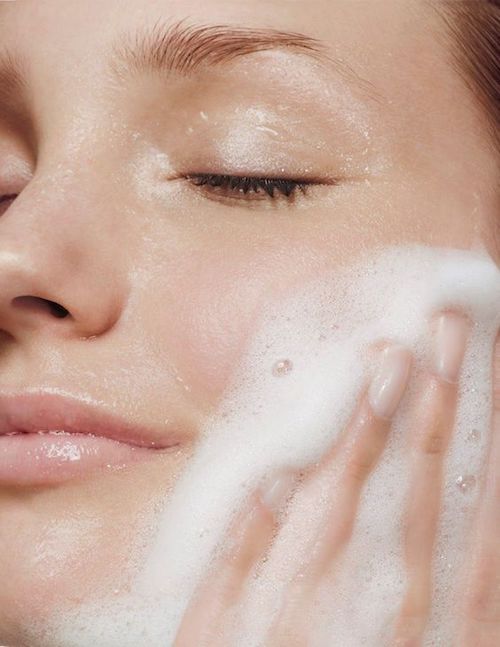
Credit: The Klog/Pinterest
Best Skincare For Oily Skin
Oily skin results from increased sebum production, leading to clogged or enlarged pores that can cause acne and congested, textured skin. When building a skincare routine for oily skin, you want to control the shine and keep your pores clear without drying out your skin. While you want to use oil-free products, selecting harsh products can backfire. By stripping this natural moisture barrier, drying products can have the opposite of their intended effect and cause your skin to increase oil production, dry out and irritate your skin, leaving you with a weakened skin barrier and a more acne-prone complexion.
Choose a gentle, foaming cleanser with a small (2%) percentage of salicylic acid. Some of the most effective cleansers contain charcoal, red or kaolin clay to absorb excess oil. If you have particularly oily skin, consider using an exfoliating cleanser with glycolic acid, a type of alpha hydroxy acid (AHA) that promotes cellular turnover, sloughs off dead skin cells, dirt and oil to keep your pores clean and is gentle enough for daily use. If you don’t use a daily exfoliating cleanser, try exfoliating 2-3 times a week for healthy, clear skin.
When choosing a toner, seek out alcohol and fragrance-free options with ingredients like salicylic acid, glycolic acid and lactic acid to clear your pores and aloe vera, rose water or green tea to calm redness and soothe the skin.
Applying an oil-free moisturizer is non-negotiable. Use a lightweight option twice daily after cleansing and toning (or deeply exfoliating) your skin. When searching for the best moisturizers for oily skin, look for ingredients such as hyaluronic acid and niacinamide to hydrate the skin and zinc PCA to control sebum production, reduce inflammation and strengthen the moisture barrier.
In the morning, the final step of your skincare routine should be applying a non-comedogenic (designed not to clog pores) sunscreen with at least SPF 30 to protect your skin from harmful UV rays. At night, consider using retinol to promote collagen production and tighten pores to help control oil production.

Credit: The Klog/Pinterest
Best Skincare For Combination Skin
Having a combination skin type means you have a balanced or oily t-zone with either dry or balanced skin on your cheeks. When building a skincare routine for combination skin, choose products that clean out the dirt and oil from your pores while also hydrating your skin. Combination skin is on a spectrum. Some individuals have a more balanced t-zone with dry patches on their cheeks, while others have an oily t-zone and very little dryness. The products you choose will depend on whether you have more oily or dry combination skin.
A gentle foaming cleanser is the safest bet for most individuals with combination skin. Foaming cleansers remove excess oil and dirt without drying out the skin. Find an option with hydrating ingredients, including hyaluronic acid and glycerin to draw in moisture and balance the skin. Gentle exfoliating cleansers or options with salicylic acid are suitable for individuals with oiler t-zones. During the colder months (or if your skin leans on the drier side), consider a hydrating gel cleanser for an extra boost of moisture without clogging your pores. Next, use a balancing toner with gentle exfoliating ingredients like witch hazel, glycolic or lactic acid and hydrating ingredients, such as vitamin E, hyaluronic acid, aloe vera or niacinamide, to absorb excess oil and replenish the moisture barrier.
Finding a moisturizer for combination skin can be tricky – especially if you have to balance extremes like a fairly oily, acne-prone t-zone and dry, flaky patches on your cheeks. With polarized skin, you may want to purchase different moisturizers for specific areas on your face to address contradicting skin concerns. Otherwise, consider using an oil-free moisturizer with nourishing ingredients like hyaluronic acid, Japanese green tea, aloe vera and vitamin A and E to hydrate your complexion without clogging your pores.
Always complete your morning skincare routine with a non-comedogenic sunscreen with at least SPF 30. Follow up your moisturizer with a retinol at night, if you choose. Use a face oil, like jojoba oil, to break down excess sebum (oil) while moisturizing dry patches on the skin.

Credit: Cupcakes and Cashmere/Pinterest
Best Skincare For ‘Normal’/Balanced Skin
If your skin generally feels comfortable, rarely gets too oily or dry, isn’t particularly sensitive and doesn’t break out often, you’ve essentially won the skin type lottery. While having balanced, ‘normal’ skin causes fewer issues, you still need to maintain a consistent skincare routine to keep your complexion healthy, smooth and radiant.
Use a gentle cleanser twice daily. After washing your face, apply an alcohol-free toner that includes nourishing ingredients like hyaluronic acid, rose water or aloe vera. Follow these steps up with an oil-free moisturizer containing peptides, probiotics, vitamin C or hyaluronic acid. Always apply sunscreen with at least SPF 30 during your morning skincare routine.
It’s beneficial to exfoliate even with normal skin. Use a gentle exfoliant, either an AHA exfoliator (chemical exfoliant), a brown sugar exfoliant or a dry brush up to 1-2 times per week.

Best Skincare For Sensitive/Acne-Prone Skin
If you have a sensitive, acne-prone complexion or are managing a chronic skin condition like eczema or rosacea, you need to focus on nourishing and strengthening your skin barrier. When building a skincare routine for sensitive skin (and any resulting conditions), always use fragrance-free, non-comedogenic products to avoid causing more irritation, inflammation or clogging your pores.
For sensitive skin, use a gentle (or milky) cleanser with nourishing ingredients like cucumber extract, aloe vera, glycerin, ceramides, niacinamide or colloidal oatmeal. Incorporate hydrating serums with ingredients like hyaluronic acid, vitamin B5, vitamin C, arnica, niacinamide and calendula oil. Follow up these steps with a deeply-nourishing moisturizer. Choose an option with ingredients like ceramides, hyaluronic acid and colloidal oatmeal to soothe any redness or irritation and to help strengthen the skin barrier. If you have eczema or rosacea, you likely can use most of these same cleanser, serum and face lotion options. Honey is an effective natural remedy for eczema that can be used as a substitute or alongside another hydrating product. Some of the other best moisturizers for inflammatory skin conditions like eczema include Aquaphor Healing Ointment and Zensa Healing Cream.
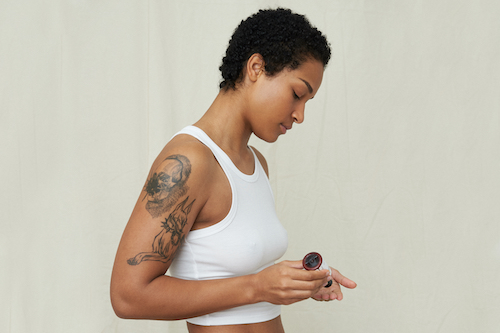
For acne-prone skin, choose a fragrance-free, non-comedogenic and oil-free cleanser with a low (2%) salicylic acid concentration. Gel-based or foaming cleansers tend to be the best options to clear your pores without irritating sensitive skin. Pair it with toner packed with exfoliating AHAs and BHAs and hydrating hyaluronic acid, vitamin B5 and other antioxidants. Use serums infused with salicylic acid, vitamin C and niacinamide.
Zensa Healing Cream contains medicinal-grade calendula oil and grapefruit oil to reduce inflammation and promote collagen to repair and hydrate the skin barrier. Combined with hydrating ingredients like cucumber extract and shea butter, Zensa Healing Cream helps manage eczema flare-ups and symptoms of similar chronic skin conditions. They also offer anti-inflammatory, antibacterial and antifungal benefits to prevent breakouts for those with acne-prone skin. Our formula is rich in vitamins A, C, D, E and K to soothe redness, hydrate rough patches or wounds, reduce hyperpigmentation (like acne scars) and relieve dry, itchy skin.
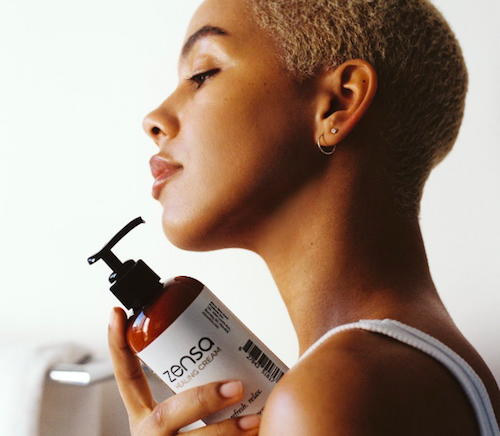
Best Skincare For Mature Skin
When building a skincare routine for mature skin, you want to include anti-aging ingredients and products into your lineup that support your general skin type (dry, normal, oily, sensitive, acne-prone). Your body’s collagen production naturally decreases with age. From around age 20, research has found that your body naturally produces around 1% less collagen every year. This loss in collagen makes you more prone to dry skin, a thinner skin texture and a weakened skin barrier.
Use a gentle cleanser that nourishes the skin without stripping away too much of your skin’s natural oils. Cleansers with glycolic or lactic acid provide a mild exfoliating effect to stimulate collagen production and promote cellular turnover (these options tend to work better if you have more balanced or oily skin). Even with dry, mature skin, regular exfoliation is important to unclog pores and resurface the skin for a healthy, glowing and more youthful complexion.
Include hydrating serums containing ingredients such as ceramides, vitamin E, fatty acids and hyaluronic acid into your daily skincare routine to support your skin barrier function and maintain a smooth skin texture. Vitamin C serum helps brighten skin dullness that often accompanies mature skin and can help with hyperpigmentation (from the sun or acne scars). When seeking the best moisturizer for mature skin, look for ingredients including peptides, ceramides, hyaluronic acid, glycerin, niacinamide, shea butter and squalane to help plump and hydrate the skin.
Sunscreen during the day and retinol at night are essentials for individuals with mature skin. Incorporate these products into your regimen in your morning and night skincare routine, respectively. If you don’t use a separate retinoid, you can combine the two skincare steps with a retinol-infused moisturizer (for night use only).
Eye cream goes from a ‘nice to have’ to a skincare routine essential once you have mature skin. The delicate skin around the eyes is one of the first areas where you’ll notice signs of aging. To combat crow’s feet and wrinkles, use eye creams with retinol to promote collagen production to eliminate fine lines, brighten dull skin, reduce hyperpigmentation, firm and improve skin texture. Also, look for hydrating ingredients like hyaluronic acid and niacinamide to moisturize this sensitive skin.

How To Determine Your Skin Type:
Knowing your skin type is an important first step to building your best skincare routine. Often, you can determine your skin type based on how your skin looks and feels throughout the day. Individuals with oily skin will most likely see that their skin becomes shiny and greasy as the day goes on. If only your t-zone (forehead, nose and chin) appear greasy and your cheeks stay matte (or feel a bit dry) throughout the day, then you probably have combination skin. Individuals with dry skin will notice their complexion will feel increasingly tight, depleted and become flaky with some potential redness and grainy, textured skin patches throughout the day.
If you get through the day with minimal to no signs of oiliness, tightness, flakiness or inflammation, you’ve been blessed with normal ‘balanced’ skin. On the opposite end of the spectrum, individuals with sensitive (or acne-prone) skin typically notice their complexion becoming inflamed, red and itchy throughout the day. However, this all-day test can be unreliable when you account for weather changes, humidity, pollution, wind or physical activity.
The ‘wash test’ is another method that helps determine your skin type. Wash your face with a mild cleanser and pat dry. Wait 2 hours without applying any additional product or makeup to determine the results. If your skin starts to look shiny all over, you have an oily skin type. A shiny t-zone and matte or tight, dry cheeks indicate combination skin. If your skin feels tight and slightly flaky or red, you have a dry skin type. Individuals with normal skin should have a complexion that feels relatively comfortable and balanced. If your skin feels reactive and inflamed with accompanying dryness or redness, you likely have sensitive or acne-prone skin – which could indicate signs of an underlying chronic skin condition or a compromised (weakened) skin barrier.
